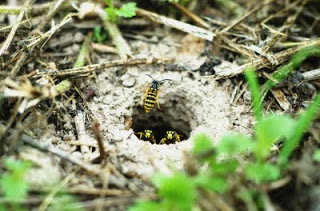My husband jerked up his head when he heard me shriek and saw me running towards the garage. He was getting ready to spray weed-killer in the beds, and I had been pulling out weeds close to the plants, where he couldn’t spray. I had just yanked out one that was near a small hole in the ground, which I assumed was used only by the moles that burrow endless tunnels under our yard.
But I was wrong.
Because right after I pulled that weed, a swarm of angry yellow jackets emerged from the hole. As soon as I saw them, I dropped my tools and sprinted for the garage.
Not fast enough, though.
One of those critters stung me on my thumb, through my gardening glove, and refused to let go until I plucked it off. But the damage was done and my thumb immediately started throbbing.
I scurried into the house and applied all the various treatments I’d heard of – raw onion, baking soda, ice – but none of them reduced the swelling or pain.
I’m not allergic to bee stings like my mother, thankfully. And I was grateful I didn’t get multiple stings. But still, the discomfort persisted and I was distracted by the pain.
I was tempted to quit working in the yard right after that incident for fear of getting stung again.
But then I recognized my fear was irrational, that other parts of the yard were perfectly safe for me to work in. So I resumed my weeding in a different bed.
What happens in life…
You may not experience a physical pain like a bee sting, yet a significant setback or disappointment can create a similar reaction. You’re tempted to withdraw and avoid situations that might expose you to additional discomfort or hurt in the future.
And that can be a smart choice if there’s real danger to your well-being.
But sometimes the threat is not as great as you imagine. Your mind can conjure up all kinds of scenarios based on a single incident, and you end up over-generalizing. You assume that having a problem in this situation will be true of all future situations. You’re afraid of encountering the same type of pain going forward, so you decide that the best approach is to retreat.
This could happen in any number of areas in your life…
- You have a negative experience with one boss or business partner and assume you can't trust any future bosses/partners.
- A presentation/sales call doesn’t go well and you lose your confidence. Now you’re afraid you won’t be able to convince anyone to buy your ideas or products.
- An intimate relationship or marriage fails and you write off any possibility of establishing a positive, healthy relationship. You’re convinced that you’re destined to have relationships that turn out badly.
When you have a bad experience, remind yourself that this one situation does not define who you are or what you’re capable of. Or what you're destined for in the future.
Remember that our brains are hard-wired from ancient times for “fight-or-flight.” But the brain has evolved, and you’re able to apply rational thinking to evaluate what’s happening and respond with logic, not emotion. You can learn to recognize when you’re applying old, outdated ideas to a new situation and make a different choice.
The key is to take time to reflect on what happened and learn from the experience. Apply those “lessons learned” to future situations so you remain open to opportunities and don’t repeat mistakes you made.
When you do this, you’re more likely to take risks because you’ll have the confidence that you can make better choices and informed decisions.





